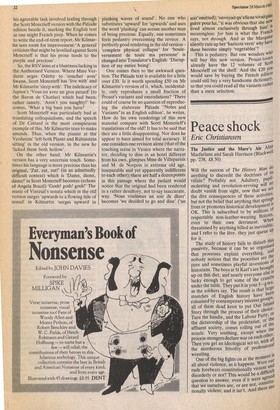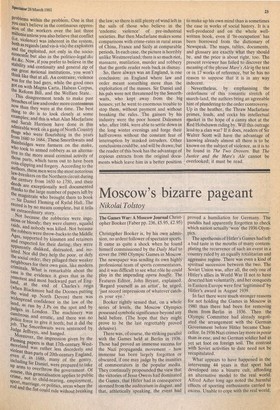Peace shock
Eric Christiansen
The Justice and the Mare's Ale Alan Macfarlane and Sarah Harrison (Blackwell pp. 238, £8.50) Will the success of The History Man d° anything to discredit the doctrines a RS villain? Probably not. Adultery, PuPii; molesting and revolution-revving will rl'„, doubt vanish from sight, now that we the dire consequences of these activities, but not the belief that anything that spring,5 from or promotes historical development OK. This is subscribed to by millions 01 respectable non-leather-wearing Britons, even to their own detriment. When threatened by anything billed as inevitable, and I refer to the litre, they just queue UP for it. The study of history fails to disturb this passivity, because it can be so organised that processes explain everything, and nobody notices that the procegses are the pure and sometimes playful inventions of historians. The boys at St Karl's are brought up on this' diet, and nearly everyone else is lucky enough to get some of the crumbs under the table. They put it in your f---g tea' as the soldiers say. The result is that large stretches of English history have been colonised by contemporary interest groups, all of them dead keen to put Our Island Story through the process of their choice. Turn the handle, and the Labour Party, or the dictatorship of the proletariat, or the affluent society, comes rolling out of the nozzle. Very soothing, except when the process-mongers declare war on each other.: Then you get an ideological set-to, with al; the murderous frivolity of professional wrestling. One of the big fights on at the moment iS all about violence, as it happens. Were our rude forebears constitutionally violent and ,.
disorderly or not? This would be a difficul; question to answer, even if it were agree' that we ourselves are, or are not, eonstitn; tionally violent; and it isn't. And there ar problems within the problem. One is that You can't believe in the continuous oppression of the workers over the last three rnillenia unless you also believe that conflict (i.e. violence) was inherent in the system, both as regards (and vis-a-vis) the exploiters and the exploited, not only in the socioeconomic but also in the politico-legal i&c 8ce &c. Now, if you prefer to believe in the stability and continuity and general zip of our great national institutions, you won't think like that at all. Au contraire; violence was for the bad guys, while the good ones got on with Magna Carta, Habeas Corpus, the Reform Bill, and the Welfare State. This disagreement tends to make past breaches of law and order more contentious now than they were at the time. The best thing to do is to look closely at some examples; and this is what Alan Macfarlane and Sarah Harrison have done in this admirable work on a gang of North Country thugs who were flourishing in the years from 1680 to 1684. These Smorthwaits and Bainbridges were farmers on the make, who took to armed robbery as an alternative to the more usual criminal activity of those parts, which turns out to have been coin-clipping and forgery. According to the authors, these men were the most notorious law-breakers on the Northern circuit during the century from 1650 to 1750, and their deeds are exceptionally well documented thanks to the large number of papers left by the magistrate who brought them to book Sir Daniel Fleming of Rydal Hall. The record is by no means complete, but it tells an extraordinary story. Not because the robberies were ingenious or bloody; they were clumsy, squalid raids, and nobody was killed. Not because the robbers were throw-backs to the Middle Ages, supported by kinsmen and retainers and respected for their daring; they were apparently disliked, distrusted, and isolated. Nor did they help the poor, or defy the social order; they pillaged their weaker neighbours for their own gain, like modern criminals. What is remarkable about the case is the evidence it gives that in the ,remotest and most backward part of England, at the end of Charles's reign (when 131ackmore had the Doones putting the wind up North Devon) there was Widespread confidence in the law of the land, as run by J.Ps on the spot and by Judges in London. The machinery was cumbrous and erratic, and there was no Police force to give it teeth; but it did the Job. The Smorthwaits were sentenced by Judge Jeffreys, and hanged. Moreover, the impression given by the Fleming papers is that 17th-century Westmoreland was rather less disorderly and violent than parts of 20th-century England, even if, in 1688, many of the gentry, including Sir Daniel, were prepared to take LIP arms to overthrow the government. Of course, this generalisation applies to public crime, not to child-rearing, employment, sport, marriage, or politics, areas where the rod and the fist could rule without breaking the law; so there is still plenty of wind left in the sails of those who believe in the 'endemic violence' of pre-industrial societies. But then Macfarlane makes some comparisons with crime-rates in rural areas of China, France and Sicily at comparable periods. In each case, the picture is horribly unlike Westmoreland; there is so much riot, massacre, mutilation, murder and robbery that the gentle reader reels back in dismay.
So, there always was an England, is one conclusion: an England where law and order meant something more than the exploitation of the masses. Sir Daniel and his pals were not threatened by the Smorthwaits, who kept away from the big houses; yet he went to enormous trouble to stop them, without payment and without breaking the rules. The gainers by his industry were the poor honest Dalesmen who, after 1684, were able to settle down in the long winter evenings and forge their half-crowns without the constant fear of interruption by "masked intruders. Other conclusions could be, and will be drawn; but the reader of this book has the advantage of copious extracts from the original documents which leave him in a better position to make up his own mind than is sometimes the case in works of social history. It is a well-produced and on the whole wellwritten book, even if 'bi-occupation' has been borrowed from the dictionary of Newspeak. The maps, tables, documents, and glossary are exactly what they should be, and the price is about right, too. The present reviewer has failed to discover the meaning of the phrase Mare's Ale in the text or in 17 works of reference, but he has no reason to suppose that it is in any way indecent.
Nevertheless, by emphasising the orderliness of this romantic stretch of march-land, the authors bring an agreeable hint of plundering to the order controversy. Up in the heather, the Thraw Macfarlane primes, loads, and cocks his intellectual Tusket in the hope of a canny shot at the Red Hobsbawm riding by. Will this outrage lead to a clan war? If it does, readers of Sir Walter Scott will have the advantage of knowing already almost all there is to be known on the subject of violence, as it is to be found in The Two Drovers. But The Justice and the Mare's Ale cannot be overlooked; it must be read.











































 Previous page
Previous page